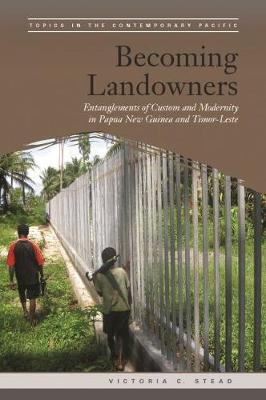Topics in Contemporary pacific
1 total work
Across Melanesia, as across much of the world, the ways in which people connect to land are being transformed by modernizing processes of change-globalization, the building of states and nations, practices and imaginaries of development, the legacies of colonialism, and the complexities of postcolonial encounters. Melanesian peoples are becoming landowners, this book argues, both in the sense that these processes of change compel forms of property relations, and in the sense that "landowner" and "custom landowner" become identities to be wielded against the encroachment of both state and capital. In places where customary forms of land tenure have long been dominant, deeply intertwined with senses of self and relationships with others, land now becomes a crucible upon which social relations, power, and culture are reconfigured and reimagined.
Employing a multi-sited ethnographic approach, Becoming Landowners explores these transformations to land and life as they unfold across two Melanesian countries. The chapters move between coasts and inland mountain ranges, between urban centers and rural villages, telling the stories of people and places who are always situated and particular but who also share powerful commonalities of experience. These stories include: a subsistence-based community shaped by the legacies of colonialism and occupation in remote Timor-Leste; villagers in Papua New Guinea resisting a mining operation and the government agents supporting it; an urban East Timorese settlement resisting eviction by the nation-state its residents hoped would represent them in the postindependence era; and people and groups in both countries who are struggling for, with, and sometimes against formal codification of their claims to land and place. In each of these places customary and modern forms of connection to land are being propelled into complex and dynamic configurations, theorized here in an innovative way as entanglements of custom and modernity.
Moving between multiple sites, scales, and forms of collectivity, Becoming Landowners reveals entanglements as spaces of deep ambivalence, where structures of power are destabilized in ways that can lend themselves to the diminishing of local autonomy, but which also create new possibilities for reasserting that autonomy.
Employing a multi-sited ethnographic approach, Becoming Landowners explores these transformations to land and life as they unfold across two Melanesian countries. The chapters move between coasts and inland mountain ranges, between urban centers and rural villages, telling the stories of people and places who are always situated and particular but who also share powerful commonalities of experience. These stories include: a subsistence-based community shaped by the legacies of colonialism and occupation in remote Timor-Leste; villagers in Papua New Guinea resisting a mining operation and the government agents supporting it; an urban East Timorese settlement resisting eviction by the nation-state its residents hoped would represent them in the postindependence era; and people and groups in both countries who are struggling for, with, and sometimes against formal codification of their claims to land and place. In each of these places customary and modern forms of connection to land are being propelled into complex and dynamic configurations, theorized here in an innovative way as entanglements of custom and modernity.
Moving between multiple sites, scales, and forms of collectivity, Becoming Landowners reveals entanglements as spaces of deep ambivalence, where structures of power are destabilized in ways that can lend themselves to the diminishing of local autonomy, but which also create new possibilities for reasserting that autonomy.
